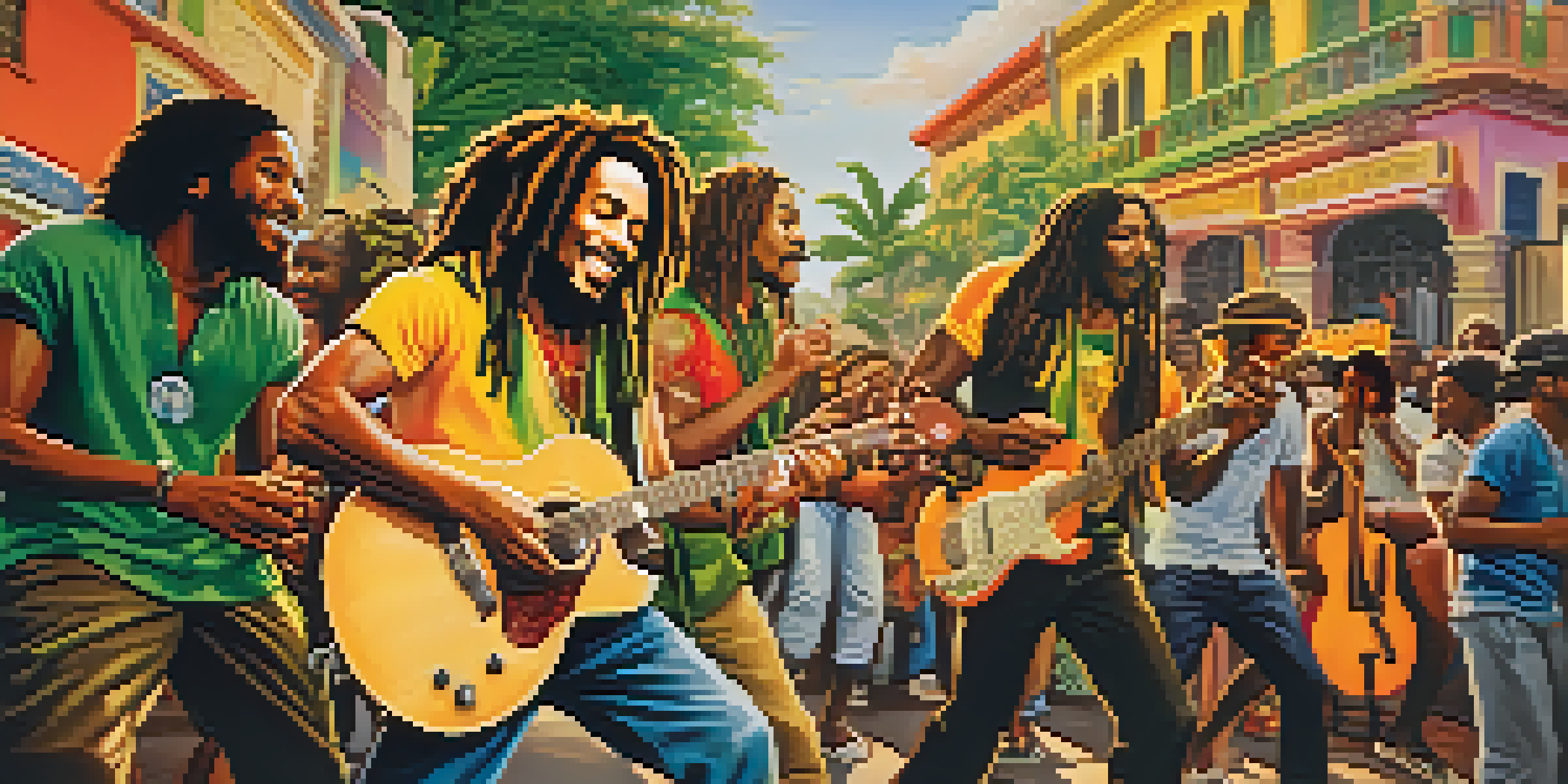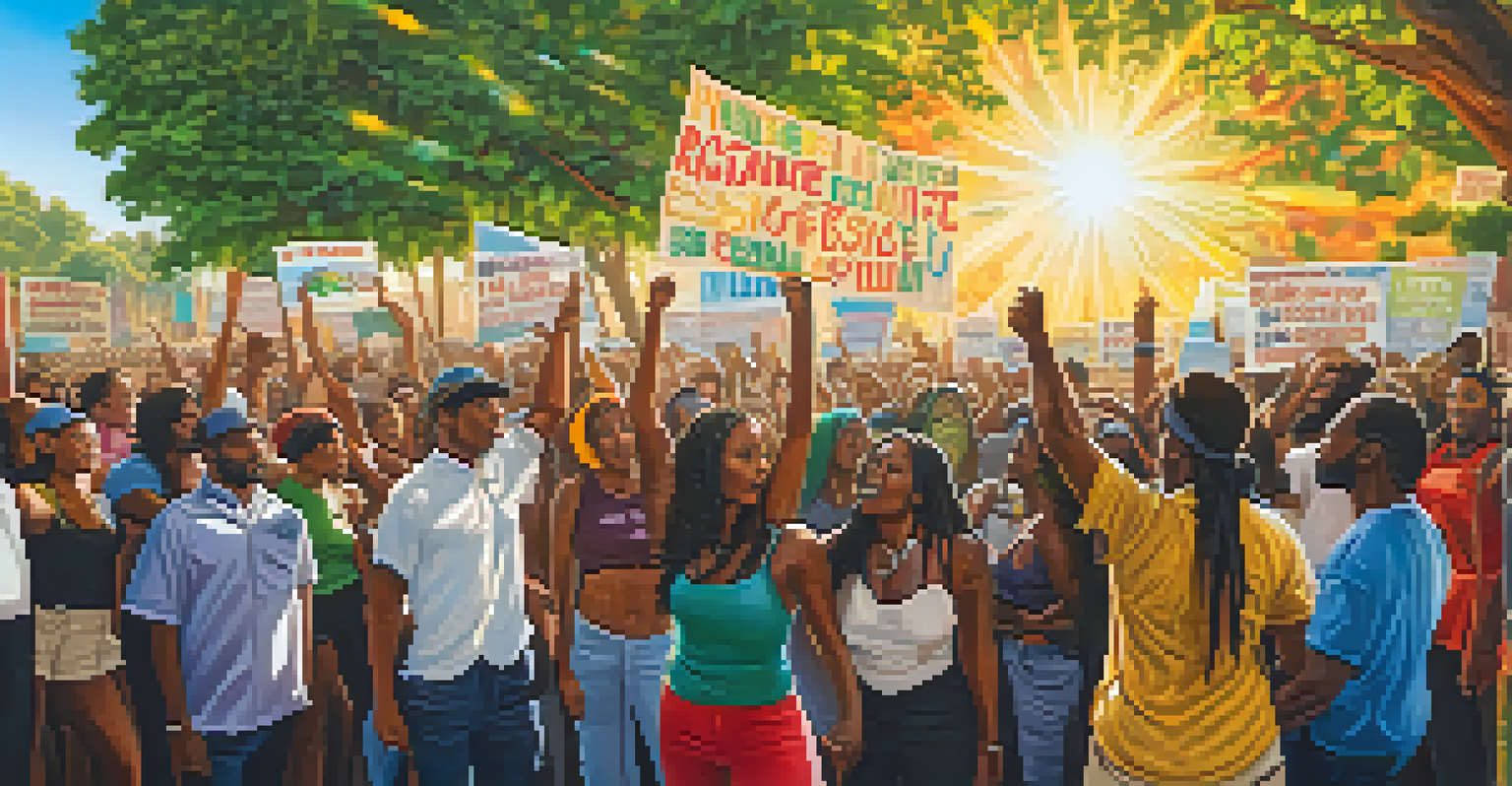The Influence of Reggae Music on Political Ideologies

Reggae's Roots in Political Activism
Reggae music emerged in Jamaica during the late 1960s, deeply intertwined with the island's sociopolitical landscape. Artists like Bob Marley and Peter Tosh used their platform to address issues such as poverty, inequality, and colonialism. These themes resonated with the struggles faced by many, making reggae a powerful tool for political activism.
One good thing about music, when it hits you, you feel no pain.
The genre’s connection to the Rastafarian movement further amplified its political messages. Rastafarianism, which promotes social justice and spiritual freedom, provided a rich backdrop for reggae lyrics that challenged the status quo. Through this lens, reggae became more than just music; it became a voice for the marginalized.
As reggae spread globally, so did its political messages. It inspired movements and artists worldwide, encouraging them to embrace social justice, equal rights, and anti-colonial sentiments, proving that music can indeed influence political ideologies.
Key Figures and Their Political Messages
Bob Marley remains one of the most iconic figures in reggae music, known not just for his melodies, but for his powerful political statements. His songs like 'Get Up, Stand Up' and 'Redemption Song' are calls to action, urging listeners to fight against oppression and advocate for their rights. Marley’s ability to blend spirituality with social commentary made his music universally relatable.

Peter Tosh, another reggae legend, took a more radical approach. His song 'Equal Rights' explicitly demands justice and equality, highlighting the struggles faced by the oppressed. Tosh's political activism went beyond music; he was known for his outspoken views against systemic racism and injustice, making him a pivotal figure in reggae's political narrative.
Reggae as a Political Voice
Reggae music emerged as a powerful medium for political activism, addressing issues like poverty and inequality.
These artists, along with others, have shown that reggae music is not just entertainment; it's a powerful medium for social change. By addressing political issues through their art, they have left a lasting impact on listeners and inspired political movements worldwide.
Reggae and Global Political Movements
The influence of reggae music extends beyond Jamaica, impacting political movements across the globe. In the 1970s and 1980s, reggae became a soundtrack for various liberation movements in Africa, particularly in countries fighting against colonial rule. The genre provided a voice for those seeking freedom and self-determination.
Equal rights and justice for all.
Moreover, reggae's themes of resistance and unity resonated with marginalized communities in the United States and the UK. Artists like Bunny Wailer and Steel Pulse inspired civil rights movements by addressing issues like racism and economic inequality. Their music served as a rallying cry, uniting people in their fight for justice.
This global reach illustrates how reggae transcends cultural boundaries, fostering solidarity among those striving for political change. Through its infectious rhythms and poignant lyrics, reggae continues to inspire activism and challenge oppressive systems worldwide.
The Evolution of Reggae's Political Themes
As reggae evolved, so did its political themes. Contemporary artists like Damian Marley and Protoje explore modern social issues, such as police brutality and economic disparity, reflecting the changing political landscape. Their music often blends traditional reggae with elements of hip-hop and dancehall, making it accessible to new audiences while retaining its activist roots.
These modern artists continue the legacy of their predecessors, using their platforms to address pressing global issues. For example, Damian Marley's 'Welcome to Jamrock' critiques the socioeconomic challenges in Jamaica, while also resonating with similar struggles in urban areas worldwide. This evolution shows that reggae is adaptable and remains relevant in today's political discourse.
Global Impact of Reggae
The genre's influence has inspired political movements worldwide, fostering solidarity among marginalized communities.
By addressing contemporary issues, these artists keep the spirit of reggae alive and ensure that its political messages continue to inspire and provoke thought among listeners. The genre's ability to evolve while maintaining its core values speaks to its enduring influence.
Reggae as a Symbol of Resistance
Reggae has long been viewed as a symbol of resistance against oppression. Its roots in the struggles of the Jamaican people have made it a powerful medium for expressing discontent with authority. The genre's beats and lyrics reflect a spirit of defiance, encouraging listeners to stand up against injustice.
This symbolism has made reggae music a staple in protests and movements worldwide. Whether it's through rallying cries or anthems for social justice, reggae serves as a unifying force that galvanizes communities. Its ability to inspire solidarity among diverse groups is a testament to its power as a political tool.
Ultimately, reggae's role as a symbol of resistance highlights the genre's significance in the ongoing fight for freedom and equality. Its music continues to inspire generations to challenge the status quo and advocate for change.
Cultural Exchange and Political Impact
The global popularity of reggae has facilitated significant cultural exchange, influencing political ideologies in various regions. As reggae music travels, it absorbs elements from different cultures and in turn inspires local movements. This exchange fosters a sense of solidarity among diverse groups, all united under the banner of social justice.
For instance, reggae has influenced genres like hip-hop, where artists often adopt similar themes of resistance and empowerment. This crossover has amplified political messages and brought them to wider audiences, showcasing the interconnectedness of struggles around the world. The fusion of reggae with other musical styles continues to inspire new generations of activists.
Evolution of Political Themes
Contemporary reggae artists continue to address modern social issues, ensuring the genre remains relevant in today's political discourse.
Through cultural exchange, reggae not only spreads its political messages but also learns from other movements. This dynamic relationship enhances the genre's relevance and ensures its place in the ongoing dialogue about social change, reflecting the ever-evolving nature of political ideologies.
The Future of Reggae and Political Ideologies
As we look to the future, the role of reggae in shaping political ideologies remains vital. New artists are emerging, bringing fresh perspectives and addressing contemporary issues like climate change, immigration, and systemic racism. This evolution ensures that reggae continues to be a voice for the oppressed and a catalyst for change.
Moreover, the rise of digital platforms has enabled reggae artists to reach a global audience more easily. This access allows for a wider dissemination of political messages, making it possible for reggae to inspire movements on an international scale. The genre's adaptability in the digital age is a promising sign for its future influence.

Ultimately, reggae's enduring legacy as a vehicle for political ideologies highlights its power to inspire action and provoke thought. As long as there are voices advocating for justice and equality, reggae music will continue to resonate as a profound force for change.